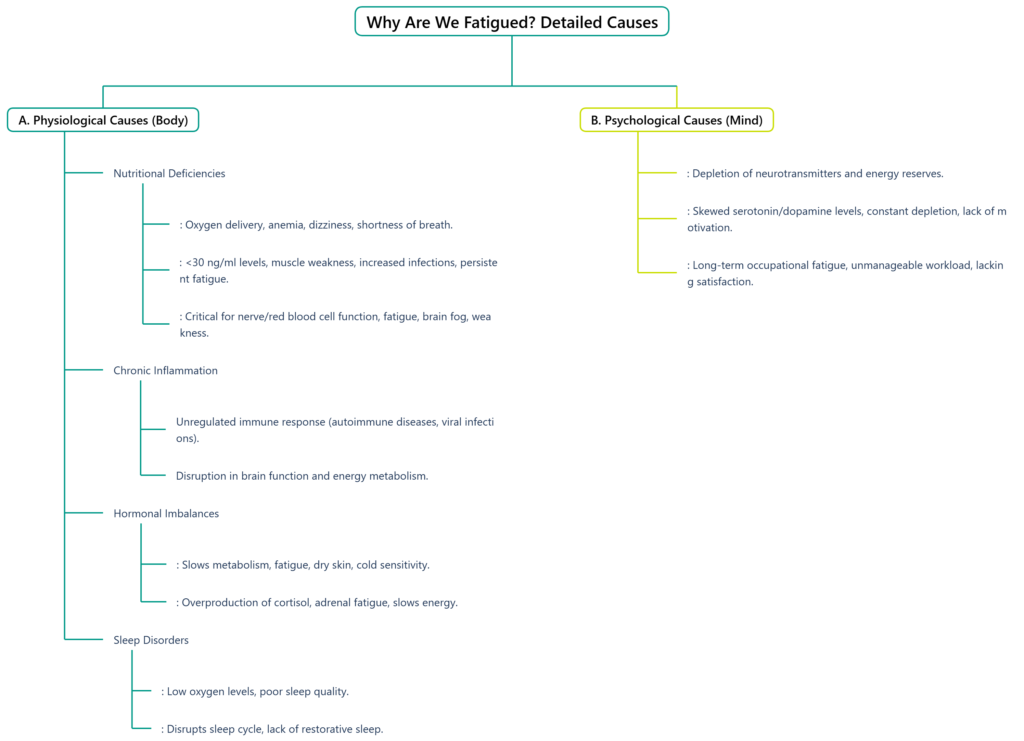
Uncover the complex causes of fatigue, its biological mechanisms, and research-backed solutions. Clear explanations for the general public.
1. What Is Fatigue? How Is It Different From Temporary Tiredness?
Fatigue is a persistent sensation of exhaustion—physical or mental—that remains even after rest. Unlike temporary tiredness (e.g., after a sleepless night), chronic fatigue lasts over six months and significantly impacts quality of life (1).
Scientific Explanations:
- Brain Mechanisms: The prefrontal cortex, responsible for concentration, shows reduced activity during intense fatigue (1).
- Cellular Energy: Mitochondria (the cell’s powerhouses) produce less ATP, the molecule fueling muscles and the brain (2).
Real-Life Example:
“After a workday, normal fatigue fades with a good night’s sleep. With chronic fatigue, rest brings no relief.”
2. Why Are We Fatigued? Detailed Causes

A. Physiological Causes (Body)
Nutritional Deficiencies:
- Iron: needed for oxygen delivery in the blood. Anemia, dizziness, and shortness of breath because of deficiency (3).
- Vitamin D: Low levels (<30 ng/ml) are linked to muscle weakness, increased infections, and persistent fatigue (4).
- Vitamin B12: Critical for nerve and red blood cell functioning. This causes fatigue, brain fog, and more literally weakness (5).
Chronic Inflammation:
- Unregulated immune response (e.g. autoimmune diseases such as lupus, rheumatoid arthritis and viral infections like Epstein-Barr virus poses Chronic inflammation leading to Continued blood leakage/leakage under enveloped ̈ilu-6)→ disruption in the function of the brain -energy metabolism (6).
Hormonal Imbalances:
- Hypothyroidism (underactive thyroid): Slows metabolism, causing fatigue, dry skin, and cold sensitivity (7).
- Adrenal Dysfunction: Prolonged stress causes the overproduction of cortisol and adrenal fatigue, and slows overall energy (8).
Sleep Disorders:
- Sleep Apnea: (no oxygen, therefore low oxygen levels and poor sleep quality) (9).
- Insomnia: it disrupts the sleep cycle leading to a lack of deep restorative (10).
B. Psychological Causes (Mind)
- Chronic Stress: this chronic depletion of neurotransmitters and energy reserves (8).
- Depression and Anxiety: Serotonin/dopamine levels are skewed so you feel depleted all the time, and lack motivation (11).
- Burnout Syndrome: Defined as long-term occupational fatigue resulting from an unmanageable workload and a deficiency in satisfying role demands (12).
Did You Know?
40% of chronic fatigue cases are linked to undiagnosed anxiety disorders (11).
3. How Do Doctors Diagnose Chronic Fatigue?
A thorough diagnosis first rules out obvious causes (anemia, thyroid issues) via:
Blood Tests:
- Complete blood count (anemia).
- Ferritin levels (iron stores).
- TSH (thyroid function) (7).
- Cortisol levels (adrenal function).
Clinical Criteria:
- Chronic Fatigue Syndrome (CFS): Requires fatigue plus at least four additional symptoms (e.g., headaches, memory issues) for six months (9).
Questionnaires:
- The Fatigue Severity Scale (FSS) assesses how fatigue impacts daily tasks (10).
4. What Solutions Actually Work? Evidence-Based Answers
Natural Solutions (Scientifically Validated)

Cognitive Behavioral Therapy (CBT):
- Assistance for patients with energy management and intervention in the “over-rest → muscle loss → increased fatigue” loop (11).
Graded Exercise:
- Brisk walking is better (10-minute walks each day, built up – exercise at a low enough level it does not increase symptoms) (12).
Anti-Fatigue Diet:
- Omega-3s (salmon, walnuts): Reduce inflammation (13).
- Magnesium (spinach, dark chocolate): Supports ATP production (2).
Medical Treatments
- Iron Supplements: These are prescribed for confirmed deficiency, and they reduce fatigue within 2-3 months (3).
- Modafinil: A stimulant used for narcolepsy, effective in some CFS cases (14).
Avoid:
“Detox” diets or fasting deprive the body of nutrients and worsen fatigue (13).
5. Chronic Fatigue and Related Conditions: Latest Research
Long COVID:
- 60% of patients have ongoing debilitating fatigue at 6 months post-infection in association with residual inflammation (15).
Fibromyalgia:
- Severe fatigue (very tired) — this is what most complain of and is primarily related to loss of restorative sleep in 80% of patients (16).
2023 Breakthrough:
- 70% of CFS patients demonstrate abnormal immune markers as shown in a Stanford study, leading toward specific treatments (17).
6. Practical Tips to Prevent Daily Fatigue

Optimize Sleep:
- Aim to sleep before midnight (pre-2 AM sleep is more restorative) (16).
- Avoid screens one hour before bed (blue light blocks melatonin).
Manage Stress:
- Practice heart coherence breathing (5-second inhale, 5-second exhale) to lower cortisol (7).
Balanced Diet:
- Start with a protein-rich breakfast (e.g., eggs, Greek yogurt) to stabilize energy.
- Snack smart with almonds and fruit (fiber + healthy fats).
Conclusion
Chronic fatigue is not “all in your head”—it’s a complex symptom often tied to biological imbalances. Advances in research from trusted sources (14, 3, 5) are unlocking personalized solutions. Consult your doctor for tailored care.